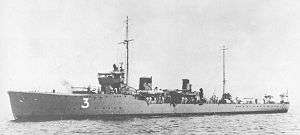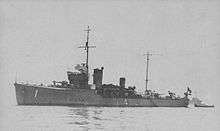W-1-class minesweeper
The W1 class minesweeper (第一号型掃海艇,, Dai Icih Gō-gata Sōkaitei) was a class of minesweepers of the Imperial Japanese Navy (IJN), serving during the 1930s and World War II. 6 vessels were built in 1922–29 under the Eight-eight fleet plan. They have two sub-classes, this article handles them collectively.
 W-3 in 1923 | |
| Class overview | |
|---|---|
| Name: | W-1-class minesweeper |
| Builders: |
|
| Operators: |
|
| Succeeded by: | W-13-class |
| Subclasses: |
|
| Cost: | 700,000 JPY (in 1920) |
| Built: | 1922–1929 |
| In commission: | 1923–1946 |
| Planned: | 6 |
| Completed: | 6 |
| Lost: | 5 |
| Scrapped: | 1 |
| General characteristics W-1-class | |
| Type: | Minesweeper |
| Displacement: | 600 long tons (610 t) standard |
| Length: | 76.20 m (250 ft 0 in) overall |
| Beam: | 8.03 m (26 ft 4 in) |
| Draught: | 2.29 m (7 ft 6 in) |
| Installed power: | |
| Propulsion: | 2 shafts, 2 × triple-expansion steam engines |
| Speed: | 20.0 knots (37.0 km/h; 23.0 mph) |
| Range: | 2,000 nmi (3,700 km; 2,300 mi) at 10 knots (19 km/h; 12 mph) |
| Complement: | 97 |
| Armament: |
|
| General characteristics W-5-class (differences only) | |
| Displacement: | 620 long tons (630 t) standard |
| Length: | 77.00 m (252 ft 7 in) overall |
| Beam: | 8.25 m (27 ft 1 in) |
| Draught: | 2.25 m (7 ft 5 in) |
| Complement: | 91 |
| Armament: | 2 × paravanes or 50 × Mk.5 naval mines |
Background
In 1920, the IJN made an Eighty-eight Fleet Plan which would provide them with eight battleships and eight battle cruisers. However, they did not forget the Hatsuse and Yashima, which had struck naval mines during the Russo-Japanese War and the IJN was afraid of this event occurring once again.
In the IJN, destroyers undertook minesweeping operations but could also lay their own minefields. As a result, the fleet wanted a brand-new minesweeper which could follow their battleships into an action and this would become the No.1-class.
Ships in classes
No.1 class
- Project number I1. 4 vessels were built in 1922-1925. W-4 was behind with the laid down by the Washington Naval Treaty.
| Ship | Builder | Laid down | Launched | Completed | Fate |
| W-1[1] | Harima Zōsen | 10 May 1922 | 6 March 1923 | 30 June 1923 | Sunk by air raid at Yamada Bay on 10 August 1945; removed from naval ship list on 15 September 1945. |
| W-2 | Mitsui, Tama Shipyard | 13 April 1922 | 17 March 1923 | 30 June 1923 | Sunk by friendly torpedo by Mogami or Mikuma[2] at Bantam Bay during the Battle of Sunda Strait on 1 March 1942; removed from naval ship list on 30 November 1945. |
| W-3 | Ōsaka Iron Works | 29 March 1923 | 30 June 1923 | Sunk by USS Parche at Ōfunato Bay on 9 April 1945; removed from naval ship list on 10 May 1945. | |
| W-4 | Sasebo Naval Arsenal | 1 December 1923 | 24 April 1924 | 29 April 1925 | Survived war; scuttled by Royal Navy off Singapore on 11 July 1946; removed from naval ship list on 10 August 1946. |
No.5 class
- Project number I2. 2 vessels were built in 1928-1929. Improved model of the No.1-class. About their appearance, foremast was changed to tripod type.
| Ship | Builder | Laid down | Launched | Completed | Fate |
| W-5 | Mitsui, Tama Shipyard | 25 March 1928 | 30 October 1928 | 25 February 1929 | Sunk by HMS Terrapin at Strait of Malacca 33°44′N 99°50′E on 4 November 1944; removed from naval ship list on 10 March 1945. |
| W-6 | Ōsaka Iron Works | 10 March 1928 | 29 October 1928 | 25 February 1929 | Sunk by air raid off Kuching 01°34′N 110°21′E on 26 December 1941; removed from naval ship list on 10 January 1942. |
Photos
 1st Minesweeping Squadron W-3 and W-2 in front
1st Minesweeping Squadron W-3 and W-2 in front W-4 in July 1930
W-4 in July 1930 W-5 in the 1930s (after the Tomozuru-Incident)
W-5 in the 1930s (after the Tomozuru-Incident) W-6 on 28 May 1933
W-6 on 28 May 1933
Footnotes
- Minesweeper W-1 (第一号掃海艇, Dai 1 Gō Sōkaitei). The same shall apply hereinafter.
- In the neighborhood of spot, many parts of the Type 93 torpedo were discovered. The Japanese destroyers which participated in Battle of Sunda Strait were not equipped with Type 93 torpedo.
Bibliography
- Jentschura, Hansgeorg; Jung, Dieter & Mickel, Peter (1977). Warships of the Imperial Japanese Navy, 1869–1945. Annapolis, Maryland: United States Naval Institute. ISBN 0-87021-893-X.
- Ships of the World special issue Vol.45, Escort Vessels of the Imperial Japanese Navy, "Kaijinsha"., (Japan), February 1996
- The Maru Special, Japanese Naval Vessels No.50, Japanese minesweepers and landing ships, "Ushio Shobō". (Japan), April 1981